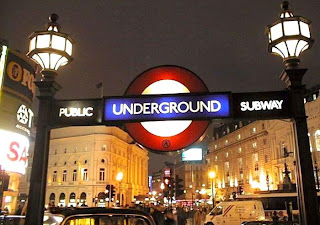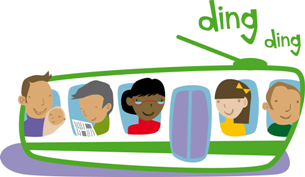 Major announcements about public transport have hit the headlines in London, Brisbane and Melbourne as a major greenhouse report says that public transport is crucial.
Major announcements about public transport have hit the headlines in London, Brisbane and Melbourne as a major greenhouse report says that public transport is crucial.In London, UK PM Brown has finally given the go-ahead to the £16bn Crossrail express rail link in London, 17 years after it was first proposed. Read the Telegraph report
In Brisbane, new Premier Bligh’s government is looking at London's public transport network as one potential model for its new Transit Authority, which will manage all buses, trains and ferries in South-East Queensland. Read a local report
In Melbourne, Premier Brumby has announced eight new trains for Melbourne. These will join the 10 new train sets announced earlier. The trains will come into service in late 2009.
Meanwhile, UNSW researcher Dr Mark Diesendorf has reported that public transport improvements could help Australia cut greenhouse gas emissions by 30% by 2020. Read Dr Diesendorf's report
Is enough being done locally to promote public transport?


8 comments:
I am concerned that you are only seeking negative comments from the public. This is somewhat one-sided and unfair. I have been using public transport for nearly 60 years (I am 62) and constantly use trains and buses throughout eastern Melbourne as part of my work. I am extremely impressed with the changes that have taken place over the past five years, especially the low-floor buses and many other access issues. I see wonderful bus-drivers and train-drivers making life much easier for people with disabilities, old people and parents with small children. Obviously they have been well trained or perhaps re-trained in how to deal with access issues. I am also impressed with the diversity of staff - Maori women with facial tattoos seem to make the best bus-drivers in my experience! (888 on Springvale Road). Trains are much better than they were - especially the Sprinters.
Of course, I, like everyone else, would like to see more public transport in a whole range of ways and locations. However, it is counter-productive to just whip up negative responses out there all the time. The PTUA have been doing that for years and wheel out the same tired and carping faces every time the government tries to introduce improvements i.e. "Not enough! Too late! Want more!" etc. etc. etc.
I recently took two older friends on a trip to Malmsbury on the train. We used suburban trains to get to Southern Cross. They had not been on trains for years as they were frightened and put off by all the negative media in the papers, the tv etc. They were really pleasantly surprised with the cleanliness and brightness of the suburban trains, loved Southern Cross station and really enjoyed a smooth and swift trip to Malmsbury on the Sprinter - lovely clean toilets, soft seats etc.
So broaden your discussion in the interests of all. Constant carping and negativity actually runs down the reputation of public transport and can inhibit people from using it!
I agree with this sentiment - the media has made out our PT system to be a hell of alot worse than it actually is, to the point where infrequent users will never be converted.
I've been using buses, trains and trams for the best part of the last 10 years or so, with no major negative incidents to report.
Of course, there is always room for improvement but things are alot better than the media makes out.
There is enough done to promote trains and trams, and as they are stuggling to cope in peak our, they probably need better services before the promotion is beefed up. But the buses could do with a major campaign. I doubt if 10% of people in melboure could name their nearest bus service.
The media strategies of the PTUA have probably been the best they could manage with their limitied resources. In my experience - and that includes large amounts of suburban and country rail travel here and in Europe as well as my own driving, the PT system in Melbourne is actually in woeful shape. My biggest gripes relate to frequency of services and integration between modes. I don't think it is possible to relate a positive portrayal of a public transport journey in Melbourne across diferent modes that could compete with the equivalent car journey. Anyone?
I disagree with the first two anonymouses. Whilst our system might be better than some, it is far worst than it should be and could be. If we just say, as you are, that we should sit back complacently, then we are deluding ourselves into thinking things will remain the same - they'll get worst and badly so.
And in reality, our system is dreadful. Bureaucrats have never heard of network planning and think freeway building is an example of a compromise between the avaricious road lobby and sustainable solutions such as rail. We need new people in power with less asinine ideas.
Can Anna Bligh The current Queensland Premier and P Beattie former Premier be serious about Public Transport and reducing green house gases?
When P Beattie allowed the former Brisbane Lord Mayor to forced onto the community The North South Tunnel, A Bligh allowed the current Lord Mayor and Councillors to forced onto the community The Hale St Bridge and her own Government is building The Airport Tunnel.
So the 1st step to prove she is serious about public transport and reduce green house gases, is for her to sack Brisbane Council Lord Mayor and The Councillors as the former and current Queensland Local Government Minister doesn't have the guts to do it.
Connex reckon their trains emit 164g of CO2 per passenger km, compared to 200g per passenger km for a one-person car. In 1999, a train passenger was producing 250g per passenger km. In other words, seven years ago your emissions would have been higher if you caught the train than if you drove. The reduction in emissions per passenger has been due to an increase in passengers per train. Reduce congestion, and we'll increase the emissions per passenger.
While Melbourne's trains are running on the same filthy brown coal electricity that the rest of the state is running on, it seems their impact on reducing emissions will be negligible. So I'd like to see more being done to look at how energy efficient our PT really is.
Connex reckon their trains emit 164g of CO2 per passenger km, compared to 200g per passenger km for a one-person car. In 1999, a train passenger was producing 250g per passenger km. In other words, seven years ago your emissions would have been higher if you caught the train than if you drove. The reduction in emissions per passenger has been due to an increase in passengers per train. Reduce congestion, and we'll increase the emissions per passenger.
While Melbourne's trains are running on the same filthy brown coal electricity that the rest of the state is running on, it seems their impact on reducing emissions will be negligible. So I'd like to see more being done to look at how energy efficient our PT really is.
Post a Comment